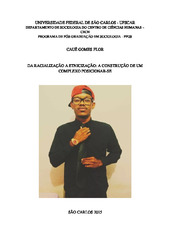| dc.contributor.author | Flor, Cauê Gomes | |
| dc.date.accessioned | 2016-10-14T14:28:54Z | |
| dc.date.available | 2016-10-14T14:28:54Z | |
| dc.date.issued | 2015-09-02 | |
| dc.identifier.citation | FLOR, Cauê Gomes. Da racialização a etnicização : a construção de um complexo posicionar-se. 2015. Dissertação (Mestrado em Sociologia) – Universidade Federal de São Carlos, São Carlos, 2015. Disponível em: https://repositorio.ufscar.br/handle/ufscar/7885. | * |
| dc.identifier.uri | https://repositorio.ufscar.br/handle/ufscar/7885 | |
| dc.description.abstract | Since 2004 the city of Lins (São Paulo) receives proportionately the largest flow of African students in São Paulo. Early in our research had about 140 students from the Portuguese Speaking Countries (PALOP): Angola, Cape Verde, Sao Tome & Principe, Mozambique and Guinea Bissau. There they live and study at the University Center of Lins (Unilins). However, are overweight young people from Angola, about 120, are the only ones who are enunciated as Angolan community. By stating this discourse, African students tout and negotiate a set of representations, state differences and promote identification processes. Thus, this work aims specifically foregrounding the experiences of these young Angolan students in Brazilian society. That there is an ethnic character positioning played by students is, and this is the hypothesis of this study, enrolled assignment expression of blackness, historical and daily to people of African descent in their collective experience. In other words, students in their stay in
Brazil undergo a process of racialization. And, in response to this denial produced by a process ethnization a positioning. Which in turn articulates intersected way these two sociological divisions (race and ethnicity). Thus, as important as the intersection and articulation of these two divisions, the form, the process, the "how" students perform this agency and negotiation is critical. You know how, in what way these students are building through complex cultural processes of identity and difference figures. From this derives the following specific objectives, though no less important: i) how and why Brazil is presented as a destination for these students? ii.) As the Angolan students perceive themselves in front of the Brazilian social formation? For if on the one hand, the particulars used to identify contribute to better understand their narratives about tensions and difficulties they experience in this new socio-cultural context; on the other, the choice of Brazil as a privileged destination for these young people is closely linked to the relations that Brazil has with Angola and other countries of Palop. | eng |
| dc.description.sponsorship | Coordenação de Aperfeiçoamento de Pessoal de Nível Superior (CAPES) | por |
| dc.language.iso | por | por |
| dc.publisher | Universidade Federal de São Carlos | por |
| dc.rights.uri | Acesso aberto | por |
| dc.subject | Racialização | por |
| dc.subject | Raça | por |
| dc.subject | Etnia | por |
| dc.subject | Pós-colonial | por |
| dc.subject | Estudantes angolanos | por |
| dc.subject | Racialization | eng |
| dc.subject | Race | eng |
| dc.subject | Ethnicity | eng |
| dc.subject | Postcolonial | eng |
| dc.subject | Angolan students | eng |
| dc.title | Da racialização a etnicização : a construção de um complexo posicionar-se | por |
| dc.title.alternative | Racialization of the ethnicization: the construction of a complex position yourself | eng |
| dc.type | Dissertação | por |
| dc.contributor.advisor1 | Silvério, Valter Roberto | |
| dc.contributor.advisor1Lattes | http://lattes.cnpq.br/9421231847055027 | por |
| dc.description.resumo | Desde 2004 a cidade de Lins (interior de São Paulo) recebe, proporcionalmente, o maior fluxo de estudantes africanos do interior paulista. No inicio de nossa pesquisa haviam cerca de 140 estudantes provenientes dos Países de Língua Oficial Portuguesa (Palop): Angola, Cabo Verde, São Tomé & Príncipe, Moçambique e Guine Bissau. Lá eles residem e estudam no Centro Universitário de Lins (Unilins). No entanto, são preponderantes os jovens provenientes de Angola, cerca de 120, sendo, os únicos que se enunciam enquanto comunidade angolana. Ao enunciar esse discurso, os estudantes africanos agenciam e negociam um conjunto de representações, afirmam diferenças e promovem processos de identificação. Nesse sentido, esse trabalho procura tematizar de forma específica a experiências desses jovens estudantes angolanos na sociedade brasileira. De que há um posicionamento de caráter étnico protagonizado pelos estudantes que é, e esta é a hipótese dessa pesquisa, expressão da atribuição adscrita da negrura, histórica e cotidianamente aos povos de origem africana em sua experiência coletiva. Dito de outro modo, os estudantes em sua permanência no Brasil passam por um processo de racialização. E, em reação a essa negação produzem por meio de um processo de etnicização, um posicionamento. Que por sua vez articula de forma interseccionada essas duas clivagens sociológicas (raça e etnia). Dessa forma, tão importante quanto a intersecção e articulação dessas duas clivagens, a forma, o processo, o “como” os estudantes realizam esse agenciamento e negociação, é fundamental. É saber como, de que forma esses estudantes estão (re)construindo através de complexos processos culturais figuras de identidade e diferença. Deste deriva os seguintes objetivos específicos, embora não menos importantes: i) como e porque o Brasil se apresenta como destino para estes estudantes? ii.) Como os estudantes angolanos se percebem diante da formação social brasileira? Pois, se por um lado, os
elementos utilizados para a identificação contribuem para entender melhor as suas narrativas sobre as tensões e dificuldades que vivenciam nesse novo contexto sociocultural; por outro, a escolha do Brasil enquanto destino privilegiado por esses
jovens esta intimamente ligada às relações que o Brasil estabelece com Angola e os demais países dos Palop. | por |
| dc.publisher.initials | UFSCar | por |
| dc.publisher.program | Programa de Pós-Graduação em Sociologia - PPGS | por |
| dc.subject.cnpq | CIENCIAS HUMANAS::EDUCACAO | por |
| dc.ufscar.embargo | Online | por |
| dc.publisher.address | Câmpus São Carlos | por |
| dc.contributor.authorlattes | http://lattes.cnpq.br/4557982568388268 | por |
